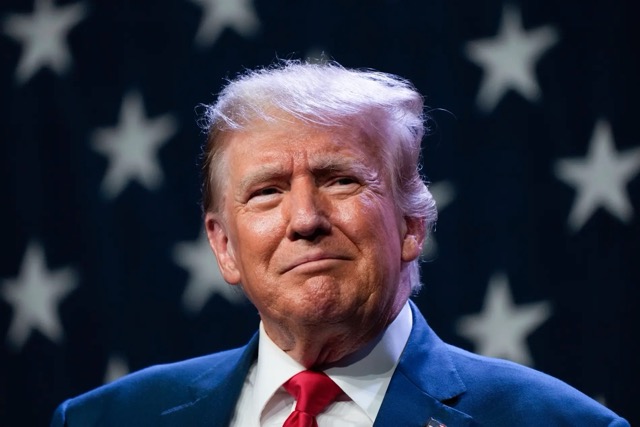Vietnamese Americans are a growing conservative force, with Republicans forming a plurality among this demographic. Silicon Valley entrepreneur Allison Huynh, who fled Vietnam after the fall of Saigon, highlighted this trend: “Vietnamese Americans are predominantly MAGA, and they voted for Trump. In Vietnam, they’re very pro-Trump as well. They love the MAGA movement because it focuses on the people and the country, and they don’t like communism or socialism.”
This sentiment aligns with data from the Pew Research Center, which shows roughly half of Vietnamese American registered voters are affiliated with the Republican Party.
Trump’s popularity in Vietnam stems from historical nationalism, pride in resilience against foreign powers, and his hardline stance against China. Trump’s slogan, “Make America Great Again,” resonates strongly with many Vietnamese citizens, reflecting their emphasis on strength and perseverance.
Shifting Opinions on Trump
Hiep, a university student in Saigon, admitted to initially disliking Trump. “He was like a stupid man, talking like a street boy, without control,” she said. However, her perspective evolved: “Gradually, he could do what he said. I personally hate Democrats, as they speak and use too much political tactics in government… tell lies.”
She also expressed admiration for Trump’s focus on technological progress, particularly in artificial intelligence (AGI). “I personally like Trump’s cabinet, including the ‘work more, talk less’ officials, like Musk. I believe that technology, especially AGI, will change the game, and Trump will surely Make America Great Again.”
For many Vietnamese citizens, Trump’s strong opposition to China is particularly significant. His actions during his presidency—such as initiating a trade war—instilled a sense of security. “His last presidency gave China so much trouble with the trade war, making Vietnamese feel safer,” Hiep explained.
Confronting China’s Maritime Aggression
China’s territorial claims in the South China Sea have long been a source of tension in the region. Vietnam, along with neighboring countries like the Philippines and Thailand, has faced Chinese aggression, including the building of artificial islands and attacks on fishing vessels.
Allison Huynh emphasized the stakes: “They’re building artificial islands around Vietnam and bullying in maritime areas between Vietnam, the Philippines, and Thailand.” She highlighted the strategic necessity of a closer alliance with the U.S. to counterbalance China’s actions.
This mistrust of China is deeply rooted in Vietnamese history. As Hiep noted, “Implicitly, in every Vietnamese, is the China threat. That fear has accumulated for more than a thousand years from colonization by the Chinese government.”
Trump’s Leadership
Many Vietnamese admire Trump for his leadership style. “He is a successful businessman. He is an elected president. Every world leader is now afraid of him,” Hiep remarked, citing examples like Trump’s tense interactions with NATO, the EU, and Ukrainian President Zelensky. Reflecting on Trump’s remarks about Canada being a “state of the United States,” she noted, “Trudeau kept silent… proving it’s true.”
Huynh added that Trump’s popularity has positively influenced U.S.-Vietnam relations. “Relations have improved dramatically. The U.S. would be wise to use these factors to our advantage,” she said.
Strategic Opportunities for the U.S.
Building a stronger U.S.-Vietnam partnership offers mutual benefits. Both nations share concerns over China’s aggression, particularly in the South China Sea. By strengthening this relationship, the U.S. can further a coalition supporting freedom of navigation and a rules-based international order.
Economically, Vietnam’s rapid growth and participation in major trade agreements like the CPTPP and RCEP provide American businesses with opportunities to diversify supply chains away from China and access broader Asian markets.
Additionally, Vietnam’s strategic location in Southeast Asia makes it a vital player in regional security, with potential for enhanced military cooperation.
Culturally, the U.S. and Vietnam share a history of successful collaborations on issues like post-war recovery, environmental projects, and educational exchanges. Strengthening these ties could encourage greater engagement from other Southeast Asian countries, bolstering America’s influence in the Indo-Pacific region.
“China and Vietnam are not close allies, and the U.S. can utilize the tension in the region to work with Vietnam in our mutual goal of containing the expansion of Chinese influence,” Huynh concluded.
As the U.S. navigates its foreign policy in a shifting global landscape, building a strategic alliance with Vietnam represents a valuable opportunity to counterbalance China’s growing influence while promoting regional stability.
 Telegram is where we really talk. Don't miss out!
Telegram is where we really talk. Don't miss out!






